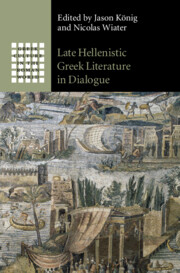Book contents
- Late Hellenistic Greek Literature in Dialogue
- Greek Culture in the Roman World
- Late Hellenistic Greek Literature in Dialogue
- Copyright page
- Contents
- Figure
- Contributors
- Preface
- Abbreviations
- Introduction
- Chapter 1 The Empire Becomes a Body
- Chapter 2 Pyrenaean Mountains and Deep-Valleyed Alps
- Chapter 3 Sailing the Sea, Sailing an Image
- Chapter 4 Ecocritical Readings in Late Hellenistic Literature
- Chapter 5 Civic and Counter-Civic Cosmopolitanism
- Chapter 6 The Wrath of the Sibyl
- Chapter 7 Imagining Belonging
- Chapter 8 Philosophical Self-Definition in Strabo’s Geography
- Chapter 9 Narrating ‘the Swarm of Possibilities’
- Chapter 10 ‘Asianist’ Style in Hellenistic Oratory and Philostratus’ Lives of the Sophists
- Chapter 11 Greek Reading Lists from Dionysius to Dio
- Chapter 12 Envoi
- References
- Index Locorum
- General Index
Chapter 9 - Narrating ‘the Swarm of Possibilities’
Plutarch, Polybius and the Idea of Contingency in History
Published online by Cambridge University Press: 21 April 2022
- Late Hellenistic Greek Literature in Dialogue
- Greek Culture in the Roman World
- Late Hellenistic Greek Literature in Dialogue
- Copyright page
- Contents
- Figure
- Contributors
- Preface
- Abbreviations
- Introduction
- Chapter 1 The Empire Becomes a Body
- Chapter 2 Pyrenaean Mountains and Deep-Valleyed Alps
- Chapter 3 Sailing the Sea, Sailing an Image
- Chapter 4 Ecocritical Readings in Late Hellenistic Literature
- Chapter 5 Civic and Counter-Civic Cosmopolitanism
- Chapter 6 The Wrath of the Sibyl
- Chapter 7 Imagining Belonging
- Chapter 8 Philosophical Self-Definition in Strabo’s Geography
- Chapter 9 Narrating ‘the Swarm of Possibilities’
- Chapter 10 ‘Asianist’ Style in Hellenistic Oratory and Philostratus’ Lives of the Sophists
- Chapter 11 Greek Reading Lists from Dionysius to Dio
- Chapter 12 Envoi
- References
- Index Locorum
- General Index
Summary
Although Plutarch is often regarded as a historian who believes in the power of providence and its influence on the lives of his protagonists, there is considerable evidence that his concept of history was more complex. His Parallel Lives feature numerous techniques of sideshadowing which confront the reader with the idea of history as a contingent, not a determined process. These narrative strategies, by means of which Plutarch frequently alludes to different possible outcomes of past events, offer short glimpses on what else might have happened.A comparison with Polybius shows that Plutarch drew upon concepts and techniques which had already been established in Hellenistic times and which presented a contingent past. But he did not simply copy these techniques, as is evident from a comparison with Polybius. He developed them further and took them to a new level by adapting them to the needs of his comparative approach to the lives of famous Greeks and Romans.
- Type
- Chapter
- Information
- Late Hellenistic Greek Literature in Dialogue , pp. 251 - 271Publisher: Cambridge University PressPrint publication year: 2022



